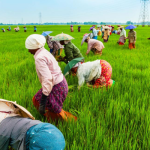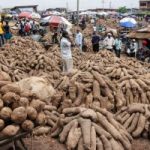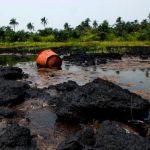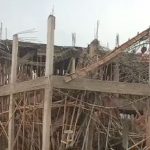Some farmers in Benue State have voiced their pain over the annual drought affecting their farmlands which has led to the reduction of agricultural productivity.
Communities mostly affected by this drought are those situated in Kwande, Ushongo and Vandekiaya local councils.
During the 1966 – 1968 droughts in Nigeria, about 250,000 people, and about 12 million animals, were estimated to have died from starvation.
Agricultural yields fell to about 40 % of normal yields.
The droughts of the 1960s also caused social backwardness, and left farmers impoverished with a poor quality of life.
According to research, The present aggregate impacts of droughts on the Nigerian economy are in the order of 4 – 6%, which can be neglected.
Community members in Vandekiaya, Ushongo, and Kwande local councils in Benue State are hoping to avoid a repetition of this event.
Farmers, residents and community leaders have traced the present drought to low rainfall in the region.
This drop in agricultural productivity may lead to the youths engaging in social vices.
Community leaders are appealing to the State government to provide relief materials and an alternative for the people.
The State government says it is already partnering with the federal government, to provide implements for irrigation farming.
The Commissioner for Agriculture, Timothy Ijir has urged farmers to key into the initiative.
Some farmers in Benue State have voiced their pain over the annual drought affecting their farmlands which has led to the reduction of agricultural productivity.
Communities mostly affected by this drought are those situated in Kwande, Ushongo and Vandekiaya local councils.
During the 1966 – 1968 droughts in Nigeria, about 250,000 people, and about 12 million animals, were estimated to have died from starvation.
Agricultural yields fell to about 40 % of normal yields.
The droughts of the 1960s also caused social backwardness, and left farmers impoverished with a poor quality of life.
According to research, The present aggregate impacts of droughts on the Nigerian economy are in the order of 4 – 6%, which can be neglected.
Community members in Vandekiaya, Ushongo, and Kwande local councils in Benue State are hoping to avoid a repetition of this event.
Farmers, residents and community leaders have traced the present drought to low rainfall in the region.
This drop in agricultural productivity may lead to the youths engaging in social vices.
Community leaders are appealing to the State government to provide relief materials and an alternative for the people.
The State government says it is already partnering with the federal government, to provide implements for irrigation farming.
The Commissioner for Agriculture, Timothy Ijir has urged farmers to key into the initiative.
Some farmers in Benue State have voiced their pain over the annual drought affecting their farmlands which has led to the reduction of agricultural productivity.
Communities mostly affected by this drought are those situated in Kwande, Ushongo and Vandekiaya local councils.
During the 1966 – 1968 droughts in Nigeria, about 250,000 people, and about 12 million animals, were estimated to have died from starvation.
Agricultural yields fell to about 40 % of normal yields.
The droughts of the 1960s also caused social backwardness, and left farmers impoverished with a poor quality of life.
According to research, The present aggregate impacts of droughts on the Nigerian economy are in the order of 4 – 6%, which can be neglected.
Community members in Vandekiaya, Ushongo, and Kwande local councils in Benue State are hoping to avoid a repetition of this event.
Farmers, residents and community leaders have traced the present drought to low rainfall in the region.
This drop in agricultural productivity may lead to the youths engaging in social vices.
Community leaders are appealing to the State government to provide relief materials and an alternative for the people.
The State government says it is already partnering with the federal government, to provide implements for irrigation farming.
The Commissioner for Agriculture, Timothy Ijir has urged farmers to key into the initiative.
Some farmers in Benue State have voiced their pain over the annual drought affecting their farmlands which has led to the reduction of agricultural productivity.
Communities mostly affected by this drought are those situated in Kwande, Ushongo and Vandekiaya local councils.
During the 1966 – 1968 droughts in Nigeria, about 250,000 people, and about 12 million animals, were estimated to have died from starvation.
Agricultural yields fell to about 40 % of normal yields.
The droughts of the 1960s also caused social backwardness, and left farmers impoverished with a poor quality of life.
According to research, The present aggregate impacts of droughts on the Nigerian economy are in the order of 4 – 6%, which can be neglected.
Community members in Vandekiaya, Ushongo, and Kwande local councils in Benue State are hoping to avoid a repetition of this event.
Farmers, residents and community leaders have traced the present drought to low rainfall in the region.
This drop in agricultural productivity may lead to the youths engaging in social vices.
Community leaders are appealing to the State government to provide relief materials and an alternative for the people.
The State government says it is already partnering with the federal government, to provide implements for irrigation farming.
The Commissioner for Agriculture, Timothy Ijir has urged farmers to key into the initiative.
Some farmers in Benue State have voiced their pain over the annual drought affecting their farmlands which has led to the reduction of agricultural productivity.
Communities mostly affected by this drought are those situated in Kwande, Ushongo and Vandekiaya local councils.
During the 1966 – 1968 droughts in Nigeria, about 250,000 people, and about 12 million animals, were estimated to have died from starvation.
Agricultural yields fell to about 40 % of normal yields.
The droughts of the 1960s also caused social backwardness, and left farmers impoverished with a poor quality of life.
According to research, The present aggregate impacts of droughts on the Nigerian economy are in the order of 4 – 6%, which can be neglected.
Community members in Vandekiaya, Ushongo, and Kwande local councils in Benue State are hoping to avoid a repetition of this event.
Farmers, residents and community leaders have traced the present drought to low rainfall in the region.
This drop in agricultural productivity may lead to the youths engaging in social vices.
Community leaders are appealing to the State government to provide relief materials and an alternative for the people.
The State government says it is already partnering with the federal government, to provide implements for irrigation farming.
The Commissioner for Agriculture, Timothy Ijir has urged farmers to key into the initiative.
Some farmers in Benue State have voiced their pain over the annual drought affecting their farmlands which has led to the reduction of agricultural productivity.
Communities mostly affected by this drought are those situated in Kwande, Ushongo and Vandekiaya local councils.
During the 1966 – 1968 droughts in Nigeria, about 250,000 people, and about 12 million animals, were estimated to have died from starvation.
Agricultural yields fell to about 40 % of normal yields.
The droughts of the 1960s also caused social backwardness, and left farmers impoverished with a poor quality of life.
According to research, The present aggregate impacts of droughts on the Nigerian economy are in the order of 4 – 6%, which can be neglected.
Community members in Vandekiaya, Ushongo, and Kwande local councils in Benue State are hoping to avoid a repetition of this event.
Farmers, residents and community leaders have traced the present drought to low rainfall in the region.
This drop in agricultural productivity may lead to the youths engaging in social vices.
Community leaders are appealing to the State government to provide relief materials and an alternative for the people.
The State government says it is already partnering with the federal government, to provide implements for irrigation farming.
The Commissioner for Agriculture, Timothy Ijir has urged farmers to key into the initiative.
Some farmers in Benue State have voiced their pain over the annual drought affecting their farmlands which has led to the reduction of agricultural productivity.
Communities mostly affected by this drought are those situated in Kwande, Ushongo and Vandekiaya local councils.
During the 1966 – 1968 droughts in Nigeria, about 250,000 people, and about 12 million animals, were estimated to have died from starvation.
Agricultural yields fell to about 40 % of normal yields.
The droughts of the 1960s also caused social backwardness, and left farmers impoverished with a poor quality of life.
According to research, The present aggregate impacts of droughts on the Nigerian economy are in the order of 4 – 6%, which can be neglected.
Community members in Vandekiaya, Ushongo, and Kwande local councils in Benue State are hoping to avoid a repetition of this event.
Farmers, residents and community leaders have traced the present drought to low rainfall in the region.
This drop in agricultural productivity may lead to the youths engaging in social vices.
Community leaders are appealing to the State government to provide relief materials and an alternative for the people.
The State government says it is already partnering with the federal government, to provide implements for irrigation farming.
The Commissioner for Agriculture, Timothy Ijir has urged farmers to key into the initiative.
Some farmers in Benue State have voiced their pain over the annual drought affecting their farmlands which has led to the reduction of agricultural productivity.
Communities mostly affected by this drought are those situated in Kwande, Ushongo and Vandekiaya local councils.
During the 1966 – 1968 droughts in Nigeria, about 250,000 people, and about 12 million animals, were estimated to have died from starvation.
Agricultural yields fell to about 40 % of normal yields.
The droughts of the 1960s also caused social backwardness, and left farmers impoverished with a poor quality of life.
According to research, The present aggregate impacts of droughts on the Nigerian economy are in the order of 4 – 6%, which can be neglected.
Community members in Vandekiaya, Ushongo, and Kwande local councils in Benue State are hoping to avoid a repetition of this event.
Farmers, residents and community leaders have traced the present drought to low rainfall in the region.
This drop in agricultural productivity may lead to the youths engaging in social vices.
Community leaders are appealing to the State government to provide relief materials and an alternative for the people.
The State government says it is already partnering with the federal government, to provide implements for irrigation farming.
The Commissioner for Agriculture, Timothy Ijir has urged farmers to key into the initiative.














